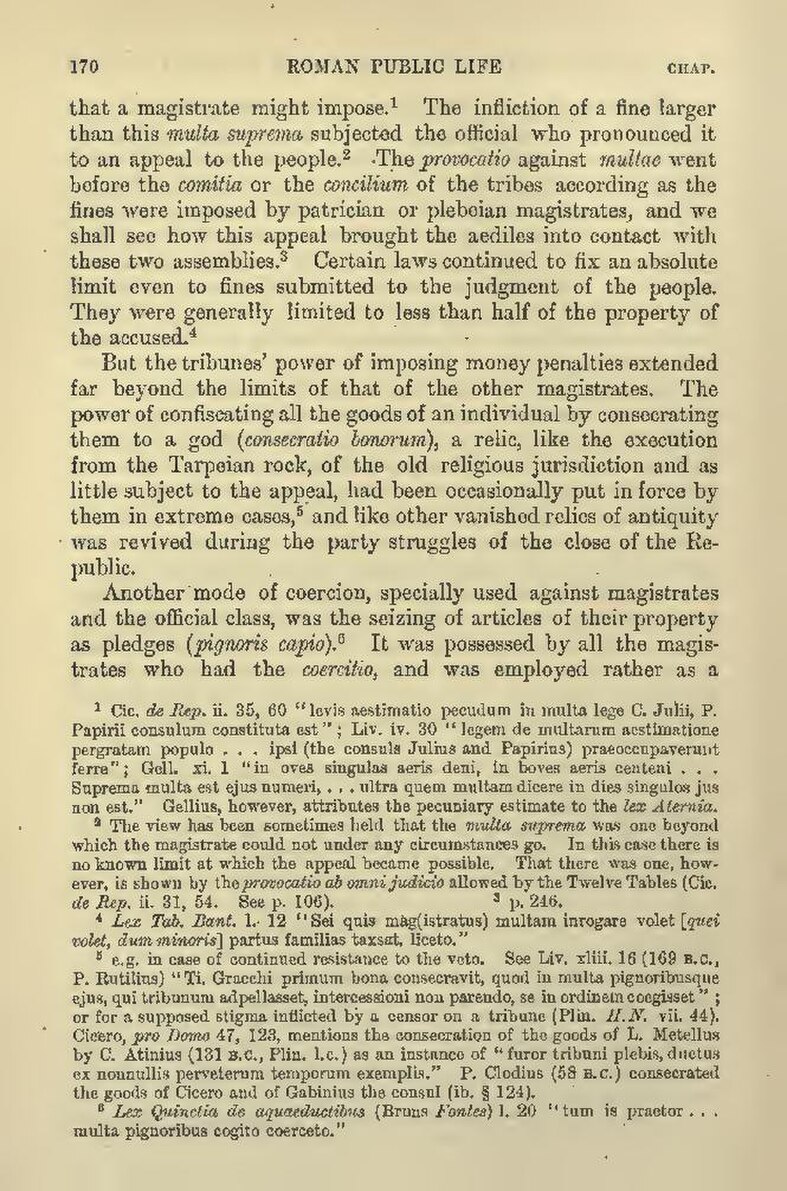that a magistrate might impose.[1] The infliction of a fine larger than this multa suprema subjected the official who pronounced it to an appeal to the people.[2] The provocatio against multae went before the comitia or the concilium of the tribes according as the fines were imposed by patrician or plebeian magistrates, and we shall see how this appeal brought the aediles into contact with these two assemblies.[3] Certain laws continued to fix an absolute limit even to fines submitted to the judgment of the people. They were generally limited to less than half of the property of the accused.[4]
But the tribunes' power of imposing money penalties extended far beyond the limits of that of the other magistrates. The power of confiscating all the goods of an individual by consecrating them to a god (consecratio bonorum), a relic, like the execution from the Tarpeian rock, of the old religious jurisdiction and as little subject to the appeal, had been occasionally put in force by them in extreme cases,[5] and like other vanished relics of antiquity was revived during the party struggles of the close of the Republic.
Another mode of coercion, specially used against magistrates and the official class, was the seizing of articles of their property as pledges (pignoris capio).[6] It was possessed by all the magistrates who had the coercitio, and was employed rather as apartus familias taxsat, liceto."]
- ↑ Cic. de Rep. ii. 35, 60 "levis aestimatio pecudum in multa lege C. Julii, P. Papirii consulum constituta est"; Liv. iv. 30 "legem de multarum aestimatione pergratam populo . . . ipsi (the consuls Julius and Papirius) praeoccupaverunt ferre"; Gell. xi. 1 "in oves singulas aeris deni, in boves aeris centeni . . . Suprema multa est ejus numeri, . . . ultra quem multam dicere in dies singulos jus non est." Gellius, however, attributes the pecuniary estimate to the lex Aternia.
- ↑ The view has been sometimes held that the multa suprema was one beyond which the magistrate could not under any circumstances go. In this case there is no known limit at which the appeal became possible. That there was one, however, is shown by the provocatio ab omni judicio allowed by the Twelve Tables (Cic. de Rep. ii. 31, 54. See p. 106).
- ↑ p. 246.
- ↑ Lex Tab. Bant. 1. 12 "Sei quis mag(istratus) multam inrogare volet [quei volet, dum minoris
- ↑ e.g. in case of continued resistance to the veto. See Liv. xliii. 16 (169 B.C., P. Rutilius) "Ti Gracchi primum bona consecravit, quod in multa pignoribusque ejus, qui tribunum adpellasset, intercessioni non parendo, se in ordinem coegisset"; or for a supposed stigma inflicted by a censor on a tribune (Plin. H.N. vii. 44). Cicero, pro Domo 47, 123, mentions the consecration of the goods of L. Metellus by C. Atinius (131 B.C., Plin. l.c.) as an instance of "furor tribuni plebis, ductus ex nonnullis perveterum temporum exemplis." P. Clodius (58 B.C.) consecrated the goods of Cicero and of Gabinius the consul (ib. § 124).
- ↑ Lex Quinctia de aquaeductibus (Bruns Fontes) l. 20 "tum is praetor . . . multa pignoribus cogito coerceto."
